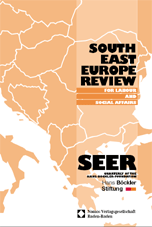Tools for enforcing labour rights and ensuring corporate social responsibility in the garment sector: the south-east European context
Tools for enforcing labour rights and ensuring corporate social responsibility in the garment sector: the south-east European context
Author(s): Bettina MusiolekSubject(s): Economy
Published by: Nomos Verlag
Summary/Abstract: The discourse on corporate social responsibility and global governance has recently become multi-faceted and particularly controversial. Solutions are being sought for the widely-accepted problems created by uncontrolled global markets and of lowering standards. “Sustainability”, “participation”, “regaining” room for manoeuvre for nation states and “public-private partnerships” are amongst those solutions under discussion. Thanks to solidarity, advocacy and the campaigning activities of new transnational networks in the field of women’s labour rights,1 the garment sector has been one of the pathfinders in this discourse. Over the past years, many retailers have begun to accept responsibility for the conditions under which the clothes they sell are produced. They have started to develop their own sets of “ethical” standards, usually in the form of corporate codes of conduct, and their own monitoring practices. In a multi-stakeholder approach, big garment retailers, mail order companies and sportswear firms have entered into a social negotiation process about social and labour standards. Additionally, the Organisation for Economic Co-operation and Development is working on its Guidelines for Multinational Enterprises. Moreover, trade unions and some governments are demanding a further introduction of social clauses in international trade agreements. This paper seeks to conceptualise these processes and discussions within a broader socio-economic environment, with special reference to south-east Europe, and undertakes to evaluate the tools for enforcing labour rights, such as codes of conduct, social clauses in trade agreements and new legal initiatives.
Journal: SEER - South-East Europe Review for Labour and Social Affairs
- Issue Year: 2002
- Issue No: 03
- Page Range: 123-135
- Page Count: 13
- Language: English

